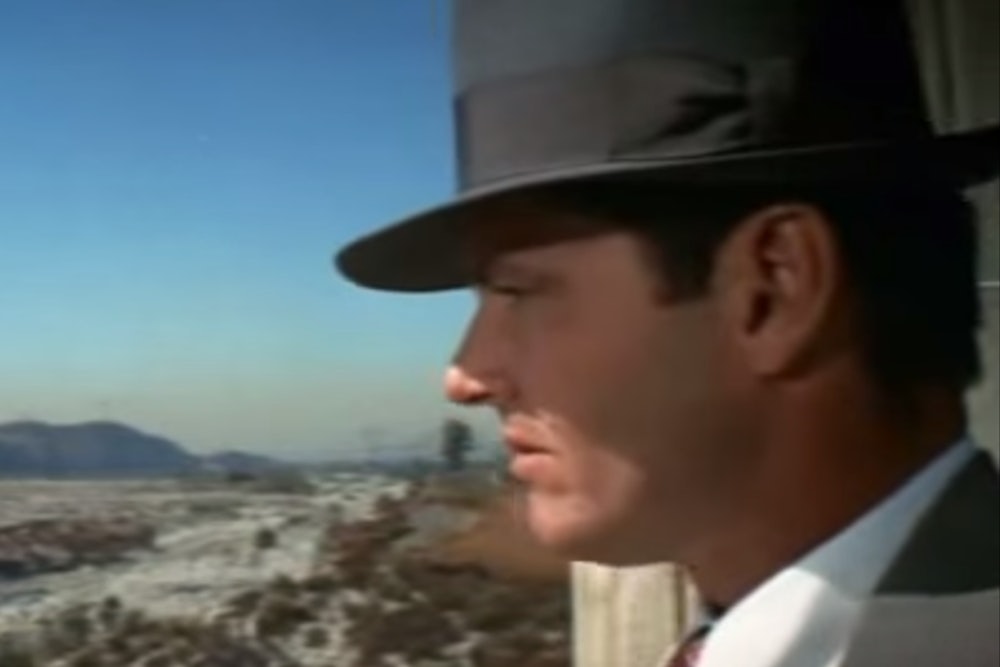If you’ve been going to the movies lately, you may have noticed a certain sort of man is missing from the screen. One who used to affect a fedora, smoke cigarettes, carry a gun, and work out of an office it would be kind to call “shabby.” Almost invariably, he also got mixed up with a femme fatale and had run-ins with both cops and crooks. In the ’40s, he searched for a mythical black bird and ended up having his heart shattered. By the ’70s, the stakes were higher, and decidedly political. He discovered his entire state was owned by one old man. The detective used to be a mainstay of American cinema. As we approach the fortieth anniversary of Chinatown, that classic of the form, one wonders what’s become of the cinematic knight errant?
According to critic Molly Haskell, author of From Reverence To Rape, the Spades, Marlowes, and Gitteses of the past haven’t vanished, they’ve just moved to television. “There’s a cornucopia of detectives on the BBC, from the edgy Dr. Edward Fitzgerald on ‘Crackers,’ to sweet DCI John Barnaby on ‘Midsomer Murders,’ to the women on ‘Prime Suspect’ and ‘Miss Marple.’ Then there are our own offbeat variants: ‘True Detective,’ ‘Justified,’ and, of course, ‘Law & Order,’ ‘CSI,’ and their various spinoffs.” Haskell thinks the detective genre has moved to the small screen because of the character of the P.I.’s experience: It may involve less physical action—a mainstay of today’s movies—and a greater degree of internal contemplation. “The detective story is no longer about representatives of the law fighting external evil,” she says, “but struggling with ones’ internal demons. We live in a post-analytic age and know that anyone drawn to crime is probably fighting his own criminal impulses.”
Wesley Strick, screenwriter of the cult classic True Believer, which stars James Woods as a problem-solving “dick” with a law degree, has several ideas about the absence of the shamus from the screen. Hollywood, he says, only wants to put “superheroes or super-jerks” on screen. “The whole point of the detective is that he’s not super. He’s flawed, human-sized. If they’re going to have a Private Eye in a film now, he’d probably have to be a zombie Private Eye.” Then there’s China: “Detective movies, usually, are talky,” Strick says. “And often a studio won’t greenlight a film unless it can play in China, which means too much talk is out.”

“Jim Carrey made Cable Guy and made all that money,” says Carl Franklin, the director of one of the few semi-recent detective movies, Devil In A Blue Dress, “and every exec followed suit, elevating the salaries for everybody. The cost of movies became so incredible, that our genre movie, which was mid-range, price-wise, went way up in budget, too.” The elevated costs, Franklin says, forced filmmakers to “rely on a broader audience to make [their] money back.”That, Franklin says, coupled with the tyranny of the first weekend’s box office gross, doomed lots of smaller films—like detective movies—which simply don’t make enough money quickly enough for the studios.
It’s not just that Hollywood economics have moved on. The detective has lost some cultural relevancy. “With the Internet,” says Strick, “everybody thinks of themselves as a detective. … Now that everyone can go online and dig up stuff, they’re not as interested in watching other people do it.” And the contemporary political mindset may also have contributed to the decline of the genre: “What use to make these movies exciting,” he says, “was the idea that a small case, usually turned out to be a big case. … Now, in the public consciousness, every case is a big case. … The misdirection that used to really make detective movies thrilling is past its sell-by date.” Of course, this isn’t really true on the small screen, where detective stories like “True Detective” still work. “I think Hollywood understands, or feels they understand, that this means viewers won’t line-up for a similar story at a theater,” Strick says.

As with most great detective movies, there doesn’t seem to be a happy ending in store for the future of this genre. Both Strick and Franklin point to pitch meetings and other acid-tests as an indication that the detective, alive and well on television, may be doomed at the cinema. “When I got out to Hollywood, in the mid ’80s,” says Strick, “I kept referencing Chinatown, for a film I’d like to get made. … After a while, a smart, pleasant female exec suggested I not mention that movie again when I went to pitch. People still consider Chinatown to be nothing more than a succès d’estime. Translation: flop. … If a Chinatown can’t make big grosses, what chance does a similar movie have?” Franklin concurs: “Look at L.A. Confidential,” he says, of the brilliant 1997 detective flick directed by Curtis Hanson. “It got amazing reviews and won two Oscars. But it was only after the Academy Awards and the re-release of the movie, did it make a small profit.”
Yet, for those of us still in love with the genre, hope persists. And, recent history shows it’s possible. After all, just two years ago, a silent, black-and white film made a strong showing at the Oscars. And it doesn’t seem all that long ago that the musical movie was looking extinct. Then, The Producers, Hairspray, and others were revived on the Broadway stage and then, in a bizarre twist, got turned (again) into hit movies. So maybe, all we need is a good play, featuring a detective, to click on The Great White Way. Okay, it didn’t quite work with The Singing Detective. But for those of us with some faith? This case hasn’t been solved or closed. Not by a long shot.
